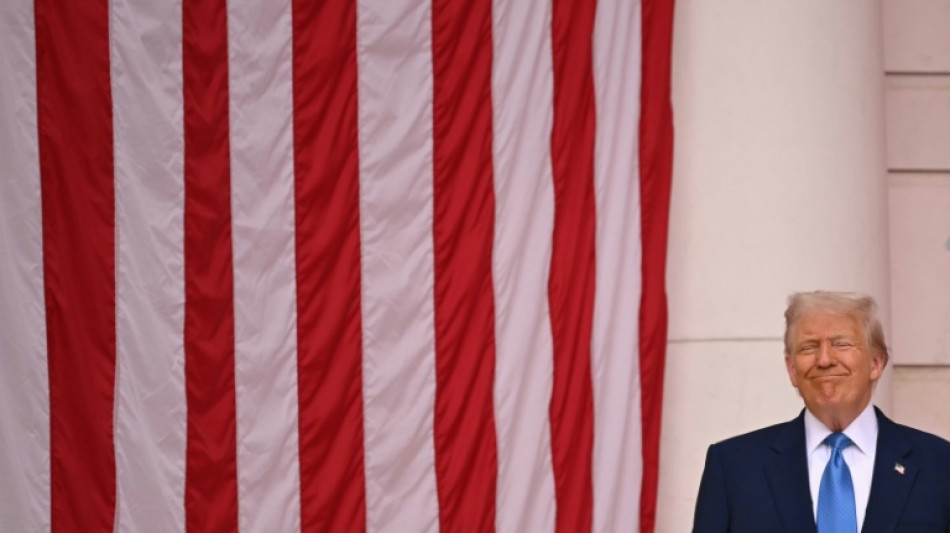
-
 US regulator approves new generic abortion pill, conservatives outraged
US regulator approves new generic abortion pill, conservatives outraged
-
'Resentment': Synagogue attack shocks Manchester Jewish community

-
 Villa win in Europa League as Forest and Scottish clubs lose
Villa win in Europa League as Forest and Scottish clubs lose
-
US farmers hit by trade war to get 'substantial' aid: Treasury chief

-
 'Terrorist attack' on UK synagogue kills two: police
'Terrorist attack' on UK synagogue kills two: police
-
Trump declares 'armed conflict' with drug cartels
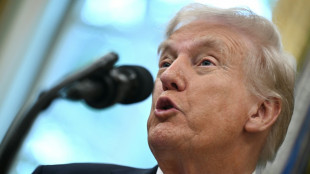
-
 Pulisic, McKennie headline US squad for October friendlies
Pulisic, McKennie headline US squad for October friendlies
-
Rallies against Israel interception of Gaza flotilla sweep Europe

-
 Trump ally threatens immigration sweep at Bad Bunny Super Bowl show
Trump ally threatens immigration sweep at Bad Bunny Super Bowl show
-
Putin vows 'significant' response as tension with Europe flares
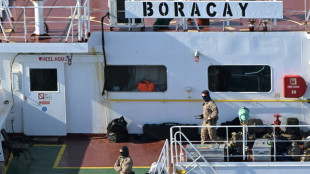
-
 Unbeaten Eagles still seeking answers in NFL clash with Broncos
Unbeaten Eagles still seeking answers in NFL clash with Broncos
-
Boom or bubble: How long can the AI investment craze last?

-
 Two killed in UK synagogue 'terrorist attack' on Yom Kippur
Two killed in UK synagogue 'terrorist attack' on Yom Kippur
-
Israel PM praises navy for intercepting Gaza bound flotilla

-
 Kenya president vows more 'professionalism' in anti-doping agency
Kenya president vows more 'professionalism' in anti-doping agency
-
US Treasury chief says 'fully prepared' to support struggling Argentina
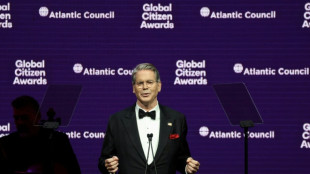
-
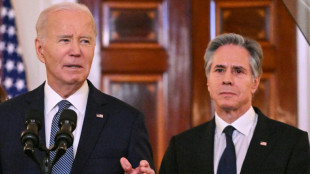 Blinken says Biden laid groundwork for Trump's Gaza plan
Blinken says Biden laid groundwork for Trump's Gaza plan
-
Musk joins 'cancel Netflix' campaign
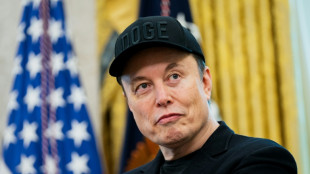
-
 Bangladesh cruise to win over Pakistan in Women's World Cup
Bangladesh cruise to win over Pakistan in Women's World Cup
-
Tesla car sales lifted by end of US electric auto tax credit

-
 Two dead, four wounded in UK synagogue 'terrorist attack'
Two dead, four wounded in UK synagogue 'terrorist attack'
-
Error 404: 48 hours of confusion in Afghanistan during internet blackout

-
 Brazilian music legend Milton Nascimento has dementia: family
Brazilian music legend Milton Nascimento has dementia: family
-
Relaxed Verstappen has 'nothing to lose' as he hunts down McLarens

-
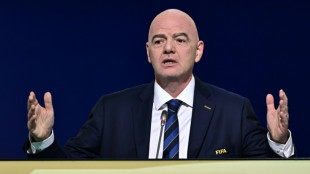 FIFA 'cannot solve geopolitical problems' like Gaza, says Infantino
FIFA 'cannot solve geopolitical problems' like Gaza, says Infantino
-
Piastri vows to learn 'tough lessons' after Baku disaster

-
 Djokovic says players 'not united enough' over tennis calendar
Djokovic says players 'not united enough' over tennis calendar
-
Days of violent anti-government protests grip Pakistan's Kashmir

-
 Irish singer CMAT delays UK tour over infected wisdom tooth
Irish singer CMAT delays UK tour over infected wisdom tooth
-
Mateta handed France call-up for World Cup qualifiers

-
 Gauff powers into Beijing semi-finals and date with Anisimova
Gauff powers into Beijing semi-finals and date with Anisimova
-
Hamilton thanks 'overwhelming' response to dog Roscoe's death

-
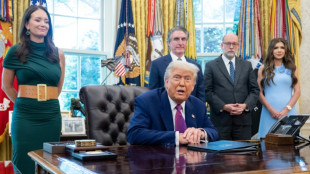 Trump ramps up pressure on Democrats over US government shutdown
Trump ramps up pressure on Democrats over US government shutdown
-
Gauff says more Slam money 'important' for future of tennis

-
 Strange 'rogue' planet spotted guzzling matter like a star
Strange 'rogue' planet spotted guzzling matter like a star
-
Two dead, three wounded in UK synagogue attack

-
 Germany reviews warship order after delays
Germany reviews warship order after delays
-
Norris says Verstappen 'genuinely a challenger' as F1 title race hots up

-
 35 years later, beloved East German car still sputters on
35 years later, beloved East German car still sputters on
-
Japan's Arc hopes take a hit with poor draw, Minnie Hauk gets plum stall

-
 Rescuers say no more signs of life in rubble of collapsed Indonesian school
Rescuers say no more signs of life in rubble of collapsed Indonesian school
-
Barcelona's Camp Nou return delayed again

-
 Israel to deport Gaza flotilla activists
Israel to deport Gaza flotilla activists
-
Contepomi backs inexperienced Argentina playmakers against Springboks

-
 Four wounded, suspect shot in Manchester synagogue attack
Four wounded, suspect shot in Manchester synagogue attack
-
Depardieu sues French broadcaster over report that sped up downfall

-
 Zelensky warns Europe Russia looking to 'escalate' war
Zelensky warns Europe Russia looking to 'escalate' war
-
Spain hosts record number of summer tourists

-
 OpenAI valuation soars to $500 bn in private share sale: reports
OpenAI valuation soars to $500 bn in private share sale: reports
-
Argentina scrum-half Cruz to start against Springboks


Trump's drive for ocean bed mining threatens law of the sea
US President Donald Trump's move to sidestep global regulations and begin pushing for seabed mining in international waters could pose a wider threat of competing countries claiming sovereignty over the ocean, experts say.
Trump last month signed an executive order to accelerate the permit-granting process for deep-sea mining in domestic and international waters, citing an obscure 1980 US law.
And the Canadian deep-sea mining frontrunner The Metals Company has already filed an application in the United States to conduct commercial mining on the high seas -- bypassing the International Seabed Authority (ISA). This is the body entrusted by a United Nations convention with managing the ocean floor outside of national jurisdictions.
Ocean law is largely guided by that accord -- the United Nations Convention on the Law of the Sea (UNCLOS), first signed in 1982 to prevent "a competitive scramble for sovereign rights over the land underlying the world's seas and oceans," according to Maltese diplomat Arvid Pardo, the convention's forebearer.
The United States never ratified the convention, which took effect in 1994, though it has applied many of its clauses.
Coalter Lathrop, an attorney at the US law firm Sovereign Geographic, told AFP that the United States is "a huge beneficiary of the parallel set of customary international law rules" despite not being a party to UNCLOS.
For instance, the United States has one of the largest Exclusive Economic Zones (EEZ) which gives states sovereignty over maritime areas up to 200 nautical miles (370 kilometers) from their coastline -- protecting them from foreign fishing boats, among other extractive industries.
If the US enjoys the benefits of ocean law, Lathrop argues, "but then you disregard the other part of the package deal -- that the seabed and its minerals in areas beyond national jurisdiction are the common heritage of humankind -- that is going to be destabilizing, to say the least, for the general legal order of the oceans."
"US unilateral permitting could lead to the disintegration of a system that has been carefully curated and created by the United States, largely for its own benefit," he added.
- 'Unraveled' -
The US and Canadian moves sparked an international outcry from ISA member states, including China, whose foreign ministry spokesman warned it violates international law.
ISA secretary general Leticia Carvalho expressed similar concern, saying that "any unilateral action... sets a dangerous precedent that could destabilize the entire system of global ocean governance."
The Metals Company does maintain contracts with ISA members like Japan -- where it has a partnership with smelting company Pamco. And experts note such ISA member states could invoke their obligation to UNCLOS to enforce maritime law on The Metals Company via these proxies, even if it ultimately receives a permit from the Trump administration.
Guy Standing, an economist at the University of London, told AFP: "It's the most dangerous thing he's done so far," referring to Trump.
If marine laws "were to come sort of unraveled," Standing said, "you could have a carve up in different parts of the world, with Russia, China and America carving up the Arctic."
However, not all scholars in the field are in agreement.
James Kraska, a professor of international maritime law at US Naval War College, said "it's naive to think the United States has that kind of influence."
"I just disagree with the people that are saying that it's somehow a legal obligation to comply with a treaty that you never joined," he told AFP.
"I just can't see any way that it's unlawful. I understand that there's sort of political opposition to it, but I would just distinguish between politics and the law."
F.Mueller--VB
